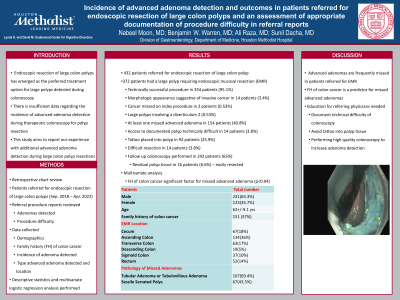Back


Poster Session D - Tuesday Morning
Category: Colon
D0102 - Incidence and Outcomes of Advance Adenoma Detection in Patients Referred for Endoscopic Resection of Large Colon Polyps
Tuesday, October 25, 2022
10:00 AM – 12:00 PM ET
Location: Crown Ballroom

Has Audio

Nabeel Moon, MD
Houston Methodist Hospital
Houston, TX
Presenting Author(s)
Nabeel Moon, MD, Benjamin Warren, MD, Ali Raza, MD, Sunil Dacha, MD
Houston Methodist Hospital, Houston, TX
Introduction: Endoscopic resection of large colon polyps has emerged as the preferred treatment option for large colon polyps detected during colonoscopy. There is insufficient data regarding the incidence of advanced adenoma detection during therapeutic colonoscopy for polyp resection. This study aims to report our experience with large colon polyp resections
Methods: A retrospective chart review was performed to identify patients referred for endoscopic resection of large colon polyps between September 2018 and April 2022. Referral procedure reports were reviewed for documentation of adenomas detected, procedure difficulty for difficult colon polyp resection. Data was collected including demographics, family history of colon cancer, incidence, and type of advanced adenoma detection during therapeutic colonoscopy. Descriptive statistics and multivariate logistic regressional analysis was performed to report outcomes
Results: A total of 432 patients were referred for endoscopic resection of large colon polyp. However, only 372 patients were deemed to have a large colon polyp requiring endoscopic mucosal resection. The procedure was technically successful in 354 patients (95.1%). 14 patients had morphologic appearance suggestive of invasive cancer (3.4%), 2 patients were found to have cancer missed on index procedure (.53%) and 2 patients has large polyps involving diverticulum (0.53%).154 patients were found to have at least one missed advanced adenoma (40.8 %) . Of these 154 patients, a total 107 patients had tubular adenoma or tubular villous adenoma (69.4%) and 67 patients had sessile serrated lesions (43.5%). On multivariate analysis, family history of colon cancer was found to be statistically significant factor for missed advanced adenoma(p< .04). 1/14 patients (3.8%) had technically difficult colonoscopy to access polyp documented. A total of 92 patients (25.9%) had a tattoo placed into the polyp, with difficulty to resect polyp encountered in 14 cases. A follow up colonoscopy was performed in 242 cases, with residual polyp tissue identified in 16 cases (6.6%) which were easily resected
Discussion: Our study shows that advanced adenomas are frequently missed in patients referred for endoscopic mucosal resection, and a family history of colon cancer was found to be a predictor for missed advanced adenomas. Education for referring physicians is needed to document appropriately the difficulty of colonoscopy and avoid tattoo into polyp tissue.
Disclosures:
Nabeel Moon, MD, Benjamin Warren, MD, Ali Raza, MD, Sunil Dacha, MD. D0102 - Incidence and Outcomes of Advance Adenoma Detection in Patients Referred for Endoscopic Resection of Large Colon Polyps, ACG 2022 Annual Scientific Meeting Abstracts. Charlotte, NC: American College of Gastroenterology.
Houston Methodist Hospital, Houston, TX
Introduction: Endoscopic resection of large colon polyps has emerged as the preferred treatment option for large colon polyps detected during colonoscopy. There is insufficient data regarding the incidence of advanced adenoma detection during therapeutic colonoscopy for polyp resection. This study aims to report our experience with large colon polyp resections
Methods: A retrospective chart review was performed to identify patients referred for endoscopic resection of large colon polyps between September 2018 and April 2022. Referral procedure reports were reviewed for documentation of adenomas detected, procedure difficulty for difficult colon polyp resection. Data was collected including demographics, family history of colon cancer, incidence, and type of advanced adenoma detection during therapeutic colonoscopy. Descriptive statistics and multivariate logistic regressional analysis was performed to report outcomes
Results: A total of 432 patients were referred for endoscopic resection of large colon polyp. However, only 372 patients were deemed to have a large colon polyp requiring endoscopic mucosal resection. The procedure was technically successful in 354 patients (95.1%). 14 patients had morphologic appearance suggestive of invasive cancer (3.4%), 2 patients were found to have cancer missed on index procedure (.53%) and 2 patients has large polyps involving diverticulum (0.53%).154 patients were found to have at least one missed advanced adenoma (40.8 %) . Of these 154 patients, a total 107 patients had tubular adenoma or tubular villous adenoma (69.4%) and 67 patients had sessile serrated lesions (43.5%). On multivariate analysis, family history of colon cancer was found to be statistically significant factor for missed advanced adenoma(p< .04). 1/14 patients (3.8%) had technically difficult colonoscopy to access polyp documented. A total of 92 patients (25.9%) had a tattoo placed into the polyp, with difficulty to resect polyp encountered in 14 cases. A follow up colonoscopy was performed in 242 cases, with residual polyp tissue identified in 16 cases (6.6%) which were easily resected
Discussion: Our study shows that advanced adenomas are frequently missed in patients referred for endoscopic mucosal resection, and a family history of colon cancer was found to be a predictor for missed advanced adenomas. Education for referring physicians is needed to document appropriately the difficulty of colonoscopy and avoid tattoo into polyp tissue.
| Patients | total number |
| Male Female | 231(65.3%) 123(34.7%) |
| Age | 62+/-9.1 yrs |
| Family history of colon cancer | 151 (37%) |
Table: Demographic information
Disclosures:
Nabeel Moon indicated no relevant financial relationships.
Benjamin Warren indicated no relevant financial relationships.
Ali Raza indicated no relevant financial relationships.
Sunil Dacha indicated no relevant financial relationships.
Nabeel Moon, MD, Benjamin Warren, MD, Ali Raza, MD, Sunil Dacha, MD. D0102 - Incidence and Outcomes of Advance Adenoma Detection in Patients Referred for Endoscopic Resection of Large Colon Polyps, ACG 2022 Annual Scientific Meeting Abstracts. Charlotte, NC: American College of Gastroenterology.
